How to Remove Personal Information From Google for Free (2025)
- What Personal Information Can You Remove From Google?
- How to Remove Personal Information from Google
- Why Removing Personal Info From Google Is Recommended
- Tips to Keep Your Personal Info Safe on Google Search
- FAQs on Removing Personal Information from Google
- Remove Personal Information From Google in Minutes
It's shocking to find sensitive data like your home address or phone number on search results, laid bare for the world to see. After all, criminals can easily use your personal information on Google for doxxing, identity theft, or stalking. To avoid this, it's crucial to safeguard your data privacy by removing private information from Google search results.
Thankfully, removing private information from Google takes only a few steps and doesn't cost a dime. Read on to find out how and to also learn some of the best practices to minimize exposure of your data via Google in the future.
What Personal Information Can You Remove From Google?
Google’s privacy policies explicitly allow you to request the removal of personal info from search results, including:
- Contact information. Such as residence addresses, phone numbers, and email addresses.
- Financial information. Including, but not limited to, bank account numbers and credit card details.
- Personal identification. Your government-issued ID, social security number, signature, or other forms of identifying information.
- Private and sensitive details. For example, your medical records, insurance information, login credentials for online accounts, and so on.
- Content about you on sites with exploitative removal procedures. If a site is hosting your personal information and demanding payment for its removal, you can request Google to remove the site from search engine result pages.
- Images of minors. As a parent or guardian of a minor (younger than 18), you can request the removal of their images.
- Non-consensual intimate or explicit content. If sexual images or videos have been shared without your consent and are discoverable on Google, you can request their removal from search results. This also includes material that is falsely linked to you, such as fake explicit imagery, porn sites that wrongly use your name, and so on.
How to Remove Personal Information from Google
Start by Googling your name to find any sensitive personal information showing up on search results (using quotation marks — e.g. “Your Name Here” — will make sure only relevant results show up). You can also use Google’s built-in “Results About You” search, although this is only available if you’re in the US. Next, copy and save links to sites or search results where your sensitive data appears. Don’t forget to check Google Images as well.
If you find anything you don’t like, you can then send a direct request to Google or the website, asking them to remove such content from search results. It’s worth noting that some social media sites, like Facebook and LinkedIn, let you choose whether your profile appears in Google search results. If that’s all you’d like to remove, it’s worth checking whether you can do this via the relevant social media platform’s settings first.
Removing Your Personal Information Using Google’s Request Form
Google has a request form to help you remove personal information, explicit pictures, and images of minors quickly. Thankfully, Google has ensured the request form is fairly streamlined, so you shouldn’t have much issue completing it. Follow my step-by-step guide to be done in minutes:
- Go to Google’s personal information removal request page and select the Remove information you see in Google Search option. The other option, Prevent information from showing in Google Search, only offers tips on how to stop your personal information from appearing on Google in the first place.
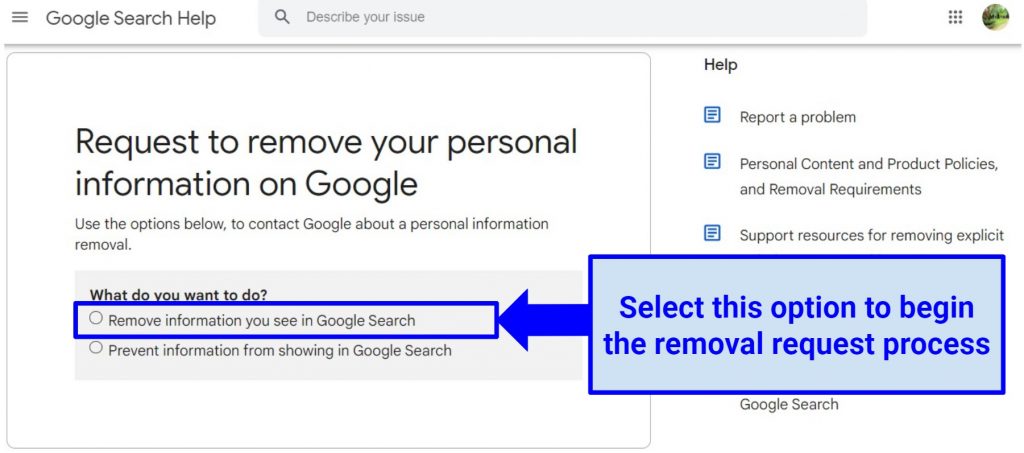 Removal request forms are found on Google’s Help Center
Removal request forms are found on Google’s Help Center - Next, select the In Google’s search results and on a website option. The other option just takes you to a page that tells you how to manually refresh outdated links and images on Google’s search results — which is only useful if the personal content has already been removed and you’re waiting to see the results.
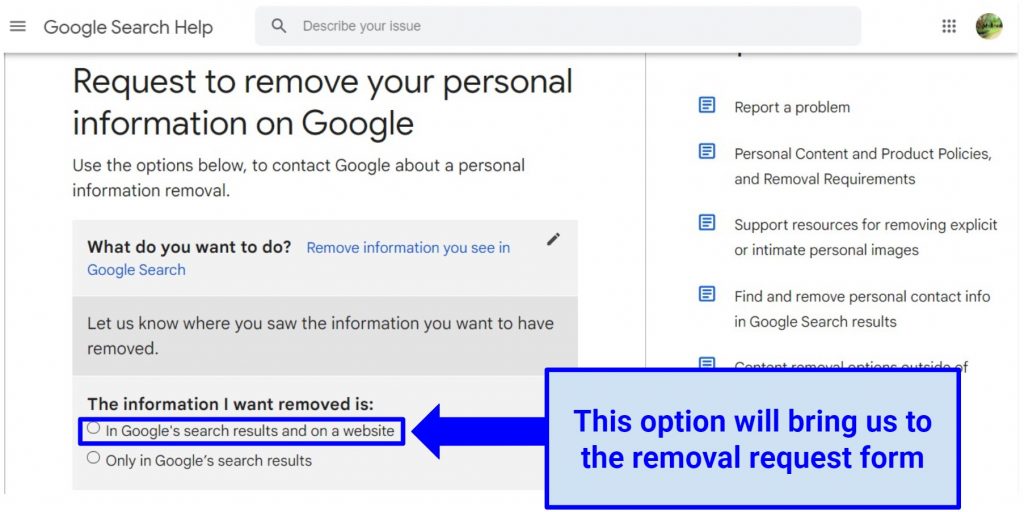 Google’s personal information removal form can be a bit confusing to follow
Google’s personal information removal form can be a bit confusing to follow - Provide all required information about the data you want removed and sign the form. You'll hear back within a few days to a week, depending on the seriousness of the matter.
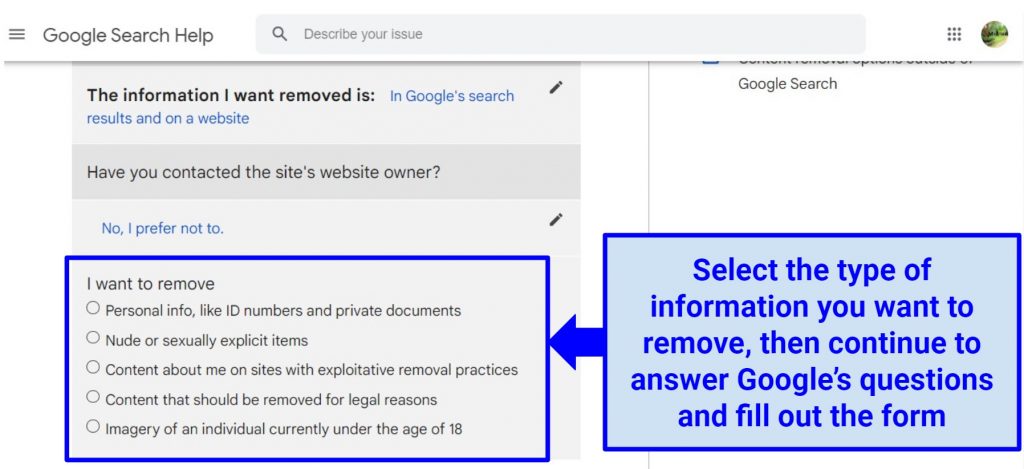 The request form is different depending on the type of information you want removed
The request form is different depending on the type of information you want removed
Keep in mind that Google will assess your request based on its policies, so ensure you read and understand the guidelines. It also helps to give as much information as possible to strengthen your case.
Removing Your Personal Information Using Google’s “Results About You” Tool
Google also has a “Results about you” dashboard to help find your personal information online and ask for its removal. This can be accessed on the Chrome browser on both desktop and phone. Just note that this feature is only available in the US and only looks through English results.
- Sign into your Google account and visit the “Results about you” page. To get there, either use the link I’ve provided, or click your Google account avatar on your desktop browser or phone app. If you’re using the Google app, the Results About You tool should appear. Otherwise, select Manage Your Google Account, followed by Data & Privacy. In the History section, select My Activity, then Other Activity. Finally, scroll down and press Manage results about you.
- Click Get Started then tap the Next button twice.
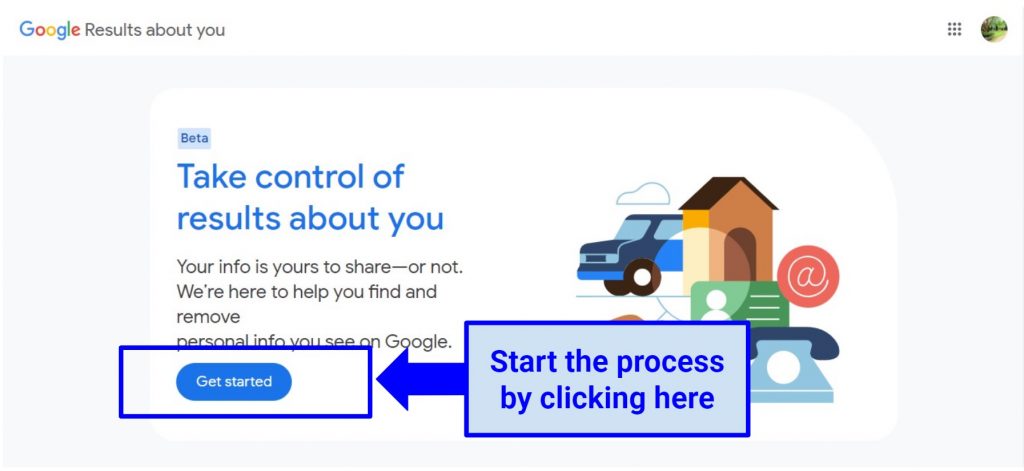 Be aware that the Results about You tool is in beta and may not work perfectly
Be aware that the Results about You tool is in beta and may not work perfectly
- Enter your personal information like name, address, and phone number when prompted. Confirm the given info is correct when asked. These details will be searched for on Google.
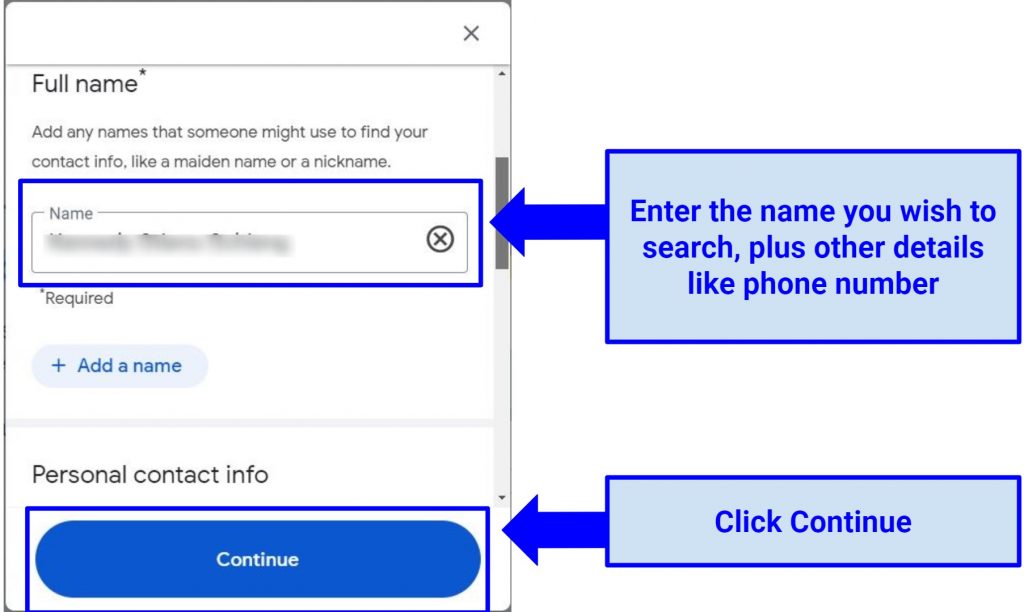 Include your home address to know if it’s showing up on Google.
Include your home address to know if it’s showing up on Google.
- Choose a way to receive notifications if Google finds your information. From here, you’re done!
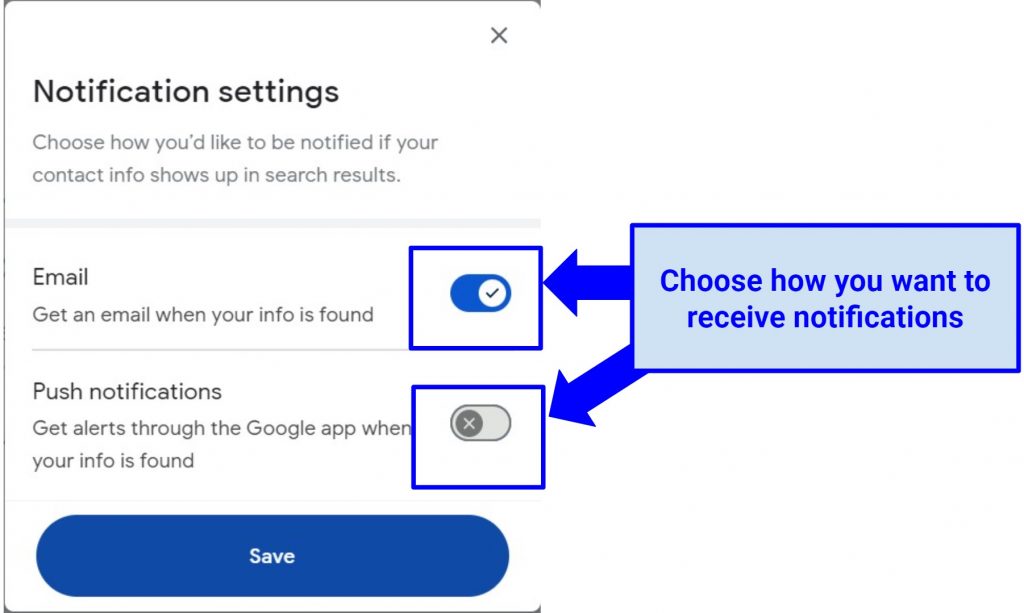 It takes less than an hour to get results in your inbox or phone app.
It takes less than an hour to get results in your inbox or phone app.
All you need to do now is regularly check your email or the Results to Review section on your Google dashboard to see if your information has been found. If it finds information you want to take down, you can issue a request to remove it. The dashboard will also show you past information removal requests and their status.
Why Removing Personal Info From Google Is Recommended
Keeping your sensitive information hidden is crucial for your online security. But there are plenty more compelling reasons to remove personal information from Google. Here’s just a few of them to consider:
- Personal safety. The less information about you that’s available online, the less likely you are to become a target for crimes like stalking, harassment, and blackmail. Information like your phone numbers or home addresses can be easily used by criminals to trace you or a family member.
- Preventing identity theft. Details like your social security number, bank account information, and other personal identifiers can be used to steal your identity. The more of this data you remove from the public eye, the less likely you are to suffer from fraud.
- Professional image. A clean online profile can make a significant difference when interviewing for a new job, applying to university, starting a business, or aiming for a promotion. Employers and clients often look up candidates and potential partners online. Any disagreeable information can tarnish your image and ruin potential opportunities.
- Reducing marketing spam. Personal information is gold for marketers in this digital era. The less info you have out there, the less likely you'll be the target of relentless online advertising or unsolicited emails.
Tips to Keep Your Personal Info Safe on Google Search
Practicing online safety principles is the first step to protecting your information from appearing on Google searches. You should take the initiative to minimize data exposure where possible. Here are some tips on how to do so:
- Limit sharing on social media. Many personal details end up on Google through social media. Adjust your privacy settings on each of your social media accounts to limit who can see your personal information. Ensure only friends or connections can view your posts, and avoid publicly sharing sensitive personal data like your email, birthday, or phone number.
- Opt out of people search sites. Public databases like Spokeo and Whitepages often collect and display personal information. Many of these platforms offer an opt-out feature. Use this to prevent your details from being listed and showing up in Google Search.
- Review app permissions. Many mobile and web apps request access to your personal information. Some of these apps may make this data visible on Google. Be selective about the apps you grant permissions to and the information you allow them to access.
- Be cautious with online forms. When signing up for newsletters or entering a contest, do not provide more information than necessary. Companies can share or sell this data to third parties who may publish it online.
- Google yourself regularly. Conducting periodic searches of your name will show you what information is publicly available. Take immediate action if you find any revealing information on the platform.
- Secure your personal websites. Make sure your blogs and websites are well secured, as hacks can often expose personal information. Also, ensure your domain has privacy protection enabled, so your personal information isn’t available via the WHOIS public record.
FAQs on Removing Personal Information from Google
Can I remove my name from Google searches?
Only in cases where your name is being used to dox you. For example, if your name and contact info is being used alongside content that is threatening, Google may remove it. To request the removal of your name and other contact details in this scenario, fill out Google’s personal information removal form.
Outside of that, you generally cannot request Google to remove content that reveals your name as per its policies. If you’d like to keep your name hidden from Google, it’s recommended to avoid using your real name for social media or other accounts, and to not reveal your real name in any online public setting.
How long does Google take to remove personal information?
It usually takes a few days to a week for Google to remove personal information. After submitting a valid removal request through Google's help page, you have to wait for it to be removed. How long this takes will depend on the severity of the matter and how complex your request is. To speed up the process, provide as much detail as possible when submitting your request.
What data does Google collect?
Google stores all personal information associated with your account. This can include your phone, email, and home or work address. Besides that, Google collects data on your search queries, visited websites, and location. You can check if any of your personal info is appearing on Google Search due to this and remove it. If you’d like, you can also tweak your account’s privacy settings and limit the information you share with Google.
Remove Personal Information From Google in Minutes
Any sensitive and private information appearing on Google can compromise your safety and possibly your reputation. The more information about you that's out there, the easier it is for someone to exploit it. It's important to continuously check and remove any data you feel shouldn't be public.
Thankfully, Google has made it easier to remove your personal data from search results. If you're willing to invest just a few minutes of your time, you can start removing personal information on Google with its quick form. To save you from constantly having to do this in the future, it’s recommended to adjust the privacy settings for all your online accounts to minimize what you share publicly online.



Please, comment on how to improve this article. Your feedback matters!